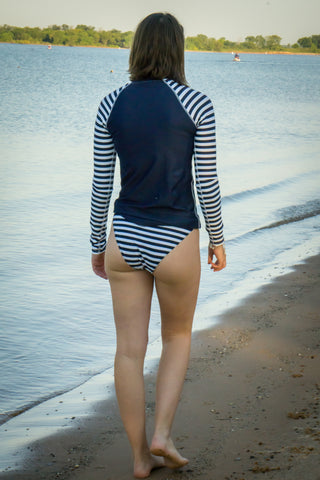Dive into Wellness: Cold Water Swimming
In recent years, cold water swimming has surged in popularity as more individuals seek unconventional ways to enhance their physical and mental well-being. This invigorating activity, also known as wild swimming or cold water swimming involves immersing oneself in cold water, be it a natural body of water or a purpose-built facility. As the interest in this practice grows, so does the awareness of its numerous health benefits.
What is Cold Water (Wild) Swimming?
Cold water swimming, or wild swimming, is not merely a recreational activity; it's a holistic experience that connects individuals with nature while promoting physical and mental resilience. Typically practiced in lakes, rivers, or the open sea, cold water swimming is an immersive activity that demands focus, discipline, and an understanding of the body's response to colder temperatures.
Dr. Mark Harper, a prominent figure in the field of cold water swimming and co-founder of Chill, emphasizes the significance of this practice for overall well-being. His insights and expertise shed light on the physiological responses that occur during cold water immersion, offering valuable information for those considering embracing this exhilarating activity [1].
The Health Benefits of Cold Water Swimming
1. Improved Circulation and Cardiovascular Health
Cold water immersion triggers a physiological response known as vasoconstriction, where blood vessels narrow. This response, followed by vasodilation (widening of blood vessels) upon exiting the water, enhances circulation. The repeated exposure to cold water can contribute to better cardiovascular health by improving blood flow, reducing blood pressure, and strengthening the heart.
2. Boosted Immune System
Regular cold water swimming has been associated with a strengthened immune system. The exposure to cold water stimulates the production of white blood cells, promoting a more robust defense against infections and illnesses. The cold shock proteins released during cold water immersion also play a role in enhancing immune function.
3. Mood Enhancement and Stress Reduction
Cold water swimming is not just a physical challenge; it's also a mental and emotional one. The shock of cold water initiates the release of endorphins, the body's natural feel-good hormones. This, combined with the meditative and serene environment often found in natural bodies of water, can significantly reduce stress, anxiety, and symptoms of depression.
4. Increased Metabolism and Weight Management
The body expends more energy to maintain its core temperature in colder environments. Cold water swimming can, therefore, contribute to increased calorie expenditure and metabolic rate. While not a substitute for a balanced diet and regular exercise, cold water swimming can be a complementary activity for those aiming to manage their weight.
5. Improved Sleep Quality
The calming effect of cold water immersion, coupled with its impact on stress hormones, can lead to improved sleep quality. Many cold water swimmers report experiencing deeper and more restful sleep after their aquatic adventures.
What to Wear When Cold Water Swimming
As enticing as the health benefits of cold water swimming may be, it's crucial to approach this activity with preparation and care. Proper gear is essential to ensure a safe and enjoyable experience in colder waters. Here are some key items to consider, with insights from a comprehensive guide on essential gear for cold water swimming by This Expansive Adventure[^2^].
1. Insulating Wetsuit
Investing in a high-quality insulating wetsuit is paramount for cold water swimmers. This piece of gear provides thermal protection, preventing excessive heat loss and allowing for more extended and comfortable swims. Look for a wetsuit that fits snugly but allows for a full range of motion.
2. Neoprene Gloves and Socks
Extremities like hands and feet are more susceptible to the cold. Neoprene gloves and socks provide additional insulation, keeping your fingers and toes warm and nimble during your cold water escapades.
3. Swim Cap and Goggles
A swim cap helps retain body heat by covering the head, while goggles protect your eyes from the chill and improve visibility in the water. Opt for a snug-fitting swim cap that covers your ears for added warmth.
4. Thermal or Base Layers
Underneath your wetsuit, consider wearing thermal layers for extra insulation. Look for materials that wick away moisture to keep you dry and comfortable throughout your swim.
5. Safety Accessories
Safety should always be a priority. Carry a brightly colored tow float to increase visibility in the water, especially in open bodies like lakes or seas. Additionally, a waterproof fitness tracker or smartwatch can help monitor your heart rate and overall well-being during your swim.
Embrace the Cold for a Healthier You
Cold water swimming is more than a trend; it's a transformative journey for both body and mind. Dr. Mark Harper's insights from Chill underscore the physiological benefits of this practice, while a well-prepared gear guide from This Expansive Adventure ensures that enthusiasts approach cold water swimming with the right equipment[^1^][^2^].
Whether you're a seasoned cold water swimmer or contemplating taking the plunge for the first time, the health benefits are undeniable. Improved circulation, a robust immune system, enhanced mood, and better sleep are just a few of the rewards awaiting those who embrace the cold for a healthier, more invigorated life. So, gear up, dive in, and let the transformative power of cold water swimming wash over you.
*Note: Before embarking on any new fitness or wellness activity, especially one as unique as cold water swimming, it's advisable to consult with a healthcare professional to ensure it aligns with your individual health needs and conditions.*
[^1^]: [Dr. Mark Harper - Chill](https://chilluk.org/chill-team/dr-mark-harper/)
[^2^]: [Essential Gear for Cold Water Swimming - This Expansive Adventure](https://www.thisexpansiveadventure.com/blog/gear-and-equipment/essential-gear-for-cold-water-swimming/#what-gear-do-you-need)

